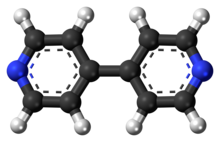4,4'-bipyridyl
 |
|
 |
|
| Names | |
|---|---|
|
IUPAC name
4,4′-Bipyridine
|
|
| Identifiers | |
|
3D model (JSmol)
|
|
| 113176 | |
| ChEBI | |
| ChEMBL | |
| ChemSpider | |
| ECHA InfoCard | 100.008.216 |
| EC Number | 209-036-3 |
| 3759 | |
|
PubChem CID
|
|
| UNII | |
|
|
|
|
| Properties | |
| C10H8N2 | |
| Molar mass | 156.19 g·mol−1 |
| Melting point | 114 °C (237 °F; 387 K) |
| Boiling point | 305 °C (581 °F; 578 K) |
| Structure | |
| 0 D | |
| Related compounds | |
|
Related compounds
|
2,2′-Bipyridine Pyridine 4-Pyridylnicotinamide Terpyridine Biphenyl |
|
Except where otherwise noted, data are given for materials in their standard state (at 25 °C [77 °F], 100 kPa).
|
|
|
|
|
| Infobox references | |
4,4′-Bipyridine (abbreviated to 4,4′-bipy or 4,4′-bpy) is a bipyridine which is mainly used as a precursor to N,N′-dimethyl-4,4′-bipyridinium [(C5H4NCH3)2]2+, known as paraquat. This species is electroactive, and its toxicity arises from the ability of this dication to interrupt biological electron transfer. Because of its structure, 4,4′-bipyridine can bridge between metal centres to give coordination polymers. 4,4′-Bipyridine can also mediate electronic effects between two paramagnetic metal centers.
...
Wikipedia
